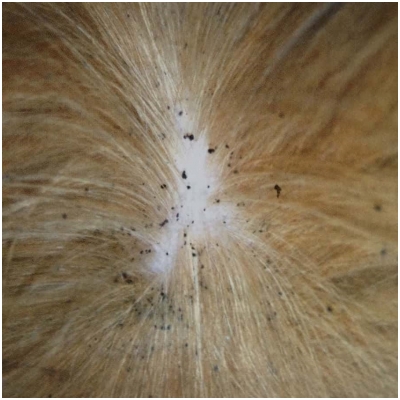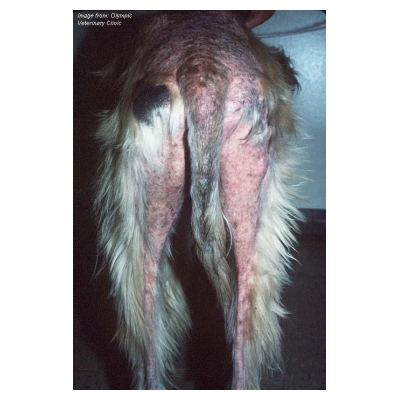

Itchy Skin and Allergies in Dogs
Itchy skin can happen for a number of reasons in dogs ranging from flea bites, to allergies, to infections. As the skin’s normal reaction to most causes of itchy skin is to become pink/red, with or without a rash, it makes diagnosing the exact cause at home particularly difficult. We understand that seeing your dog constantly itching, scratching, and chewing at their skin is incredibly difficult for both of you. The following information on this page is intended to educate pet owners on common causes of itchy skin and allergies in dogs. Tap on the links below to read further about:
- Diagnostic tests used to investigate why your dog is itchy
- Management & treatment options available to help control itchy skin and allergies
Unfortunately for most dogs with allergies, there is no quick-fix or easy cure, and they will require lifelong management plans, unique to their particular diagnosis and allergic triggers.
Common causes of itchy skin & allergies in dogs
1) External parasites
Fleas are one of the most common reasons for itchy skin in dogs. Adult fleas may be easily seen when parting your dog’s fur or you might find their droppings, known as flea dirt.
Flea dirt looks like flecks of black/brown material (pictured below).
During a thorough examination, your vet will check your dog’s coat carefully for any sign of fleas.

Other parasites that cause itchy, irritated skin and fur loss are mites such as the Demodex and Sarcoptes species. Demodex mites can be found in the skin of healthy dogs, it is only when they overgrow that they cause a problem. Most of the time there is no, or only mild itching present, and the only sign of overgrowth in some dogs may be patchy hair loss. Sometimes overgrowth of the Demodex mite can be caused by hormonal fluctuations (e.g. going through puberty in dogs) or by underlying diseases. Depending on your dog’s age and findings on examination, your veterinarian may recommend blood tests to see if there is any underlying condition contributing to the Demodex mite infestation. In comparison, Sarcoptes mites cause extreme itching and are not normally present in healthy dogs. Scarcoptes mites are highly contagious, and spread between dogs which have come into contact. As Sarcoptes mites can also bite people, owners often find that they are itchy as well, often in areas which have contacted the pet, such as the hands, arms and chest. Fortunately, infection with Sarcoptes is rare in dogs in New Zealand. If you and/or your family develop a rash from being in contact with a pet infected with Sarcoptes, please consult your family doctor for further advice & treatment.
There are many options available for flea control and prevention, most of which require regular application every 4-6 weeks, but animals with allergies to fleas may need more frequent treatment - please discuss with a veterinarian before increasing the labelled frequency of any flea treatment. Your veterinarian will advise you as to which options are best suited to your dog, and a number of these products will also treat mites. As a staggering 95% of the flea population lives off your dog and within the environment, your veterinary team will also discuss how to treat your home. It is important to remember that regular flea prevention is of vital importance all year round for optimal control. Fleas can also carry the tapeworm Dipylidium caninum, blood parasites such as Mycoplasma haemofelis, and the bacteria Bartonella that has been linked to cat scratch fever. More reasons to keep your pet’s flea control up to date!
- Find out more about your pet's options for flea control here.
- Learn more about the other diseases, bacteria and parasites that fleas can transmit to both pets and humans here.
2) Flea allergy dermatitis (FAD)
If fleas weren’t enough of a bother, some of our dogs are allergic to them – specifically to their saliva! Even just one bite from a single flea can cause extreme itchiness to those individuals that are sensitive. Flea allergy dermatitis often causes an itchy rash at the base of the tail, sometimes extending down the back of the hindlegs. For these dogs, continuous regular flea prevention (for all animals in the household) is essential to keep their skin under control and comfortable.


3) Atopic dermatitis - also known as atopy, environmental allergies or canine atopic dermatitis (CAD)
A dog with atopic dermatitis develops an allergic reaction to substances in the environment that would usually be considered harmless. These environmental triggers are known as ‘allergens’ and include plant pollens, molds, dust mites, and grasses. The allergic reaction usually presents itself as itchy, red, and inflamed skin and results in scratching and chewing, sometimes to the point of traumatising the skin. Dogs with atopic dermatitis may also be prone to developing ear infections. Signs of atopic dermatitis tend to start between 1-3 years of age and there is believed to be a genetic predisposition. Atopic dermatitis is one of the most common causes of itchy skin in dogs and can occur year-round or seasonally.
4) Contact allergy
A contact allergy refers to when a dog comes into direct contact with a substance that causes an allergic reaction. Plants such as the wandering jew. are common causes of contact allergy. For example, when out for a walk, a plant might touch the underside of the belly, as well as the groin, chin, and paws.The skin tends to become red and itchy in the areas that directly touch the offending substance. Contact allergies often occur on the non- or only finely-haired areas of the armpits, tummy and groin - this is because these areas are in close contact with the allergen whilst walking or lying down and are not protected by the hair coat. Sometimes, they can occur around the muzzle region if the pet has put his/her face in contact with the allergen. As the reaction only occurs after direct contact, try walking your dog on the footpath only for two weeks to assess the response.


5) Food allergy
Some dogs may develop an allergic reaction to one or more foods over time. Common food allergens include proteins such as chicken, beef, or pork but can also include carbohydrates like wheat, soy, and corn. Food allergy presents similarly to atopy with red and itchy skin; however, some dogs will also have gastrointestinal signs such as vomiting or diarrhoea. The signs of food allergy tend to be present all year round unless the diet is changed. Differentiating between atopic dermatitis and food allergy can be difficult. The best way to diagnose a food allergy is by conducting a strict elimination diet trial (discussed here). A food allergy is controlled by avoiding feeding the ingredient or food in question to your dog during their lifetime.
6) Bacterial and yeast infections
Bacterial and yeast infections of the skin usually occur secondary to other causes. The most common cause that we see here is secondary to an underling allergy. Bacterial and yeast infections can be very itchy, and can add extra itch to an underlying allergy. If the infection occured secondary to an allergy, then the underlying allergy needs to be treated or managed to prevent recurrence.
Does your dog have itchy skin?
The above information is provided for educational purposes only and not intended or implied to be a substitute for professional veterinary medical advice, diagnosis or treatment; and should not be relied on solely as veterinary advice.
If you are concerned that your dog has a skin condition, please phone us on (06) 3588675 to book them in with our team of veterinarians for a check over. It is helpful to bring along the flea medications, any pet shampoos and oral medication that your pet is on. It will also be very helpful if you could bring along the brand and flavour of your dog's food and treats to the consultation - take a photo of the dog food packets/cans if this is easier.
Published by Cahill Animal Hospital on 21 June 2021